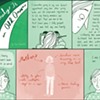Published March 29, 2016 at 10:00 a.m. | Updated April 4, 2022 at 8:03 p.m.
Bad dreams are common during childhood — almost every parent has comforted a child upset by one. But on rare occasions, sleeping children may sit up in bed, scream and act very frightened. Though seemingly awake, they are completely unaware of their surroundings. This more-intense phenomenon is called a night terror.
Dr. Lewis First, head of pediatrics at Vermont Children's Hospital, differentiates between nightmares and night terrors, offers advice for what to do if your child experiences them, and helps make them a little less scary — for parents.
KIDS VT: Are night terrors the same as nightmares?
LEWIS FIRST: No. Nightmares are basically very bad dreams and are generally triggered by things that bother you. For a toddler, that can be separation from a parent, something scary they saw on television, a new school or the birth of a sibling. With older children and adolescents, they can result from the fear of losing a parent, friend or pet, news of a disaster or something else that's emotional. They usually occur in the wee hours of the morning or toward the end of sleep, when the brain is in rapid eye movement, or REM, sleep — the phase when the brain is processing images, thoughts and ideas from the day. REM sleep is not deep sleep, so you tend to remember what happens in that phase.
KVT: What exactly is a night terror?
LF: Night terrors are far more dramatic — and they can be very scary to witness. Kids will bolt upright in bed, scream, shout, breathe fast, sweat, thrash about and act very frightened. This usually occurs in the first half of the night — or whenever the child is asleep for enough time to enter a deep sleep. We're not exactly sure what's happening in the brain but the belief is kids experience night terrors as they transition from one deep state of sleep to another.
KVT: What should parents do if it happens?
LF: They can try to comfort their child, but often the child is not going to want comforting. Don't worry if the child doesn't acknowledge that you're there and even tries to push you away. Their eyes may even be open but they're not processing what's going on around them. Parents should just wait it out and make sure the child doesn't get hurt by thrashing or falling. Usually within five to 15 minutes, the child will quickly stop shouting and flailing and return to sleep. The one thing you don't want to do is wake the child up during a night terror.
KVT: Why not?
LF: Because it's very tough to do, and when kids are woken up during a night terror they'll be disoriented and confused and it will take them a lot longer to settle down and go back to sleep. But the next day, they'll have no memory that they even had one because they were in such a deep sleep.
KVT: Do night terrors tend to occur at a certain age?
LF: Generally they happen between the ages of 4 and 12. They may happen just once and never happen again. Or they may happen periodically. Only 3 to 6 percent of children will ever have one, though they tend to run in the family. If a child has night terrors, about 80 percent of the time another immediate family member has had them, too.
KVT: Are night terrors a symptom of some underlying problem?
LF: No, they're not indicative of some deep psychological problem, and they will eventually self-correct. They're very scary to watch but only dangerous if your child gets out of bed and starts moving around the house and gets hurt.
KVT: Is there a way to prevent nightmares or night terrors?
LF: They're not preventable, but there are ways to reduce their frequency. For example, being overtired or sleeping in a new environment may trigger them. Having a regular bedtime, taking a nice warm bath, a little snuggling, some reading and quiet talk, providing a favorite stuffed animal or toy — all these things make the child feel supported and calm and generate pleasant thoughts as they drift off to sleep.
KVT: What should parents do if night terrors occur repeatedly?
LF: If they're occurring, say, two or three hours into sleep, there's some evidence that waking the child up shortly before then will disrupt the cycle. If parents are worried about a child who's having an ongoing sleep problem, the best thing they can do is keep a sleep diary. Parents should record where the child sleeps, what the child needs to fall asleep, how long it takes, how many hours of sleep the child gets and how often he or she wakes up during the night. With that information, your health care professional can begin to help work through the problem.
KVT: Anything else parents should know about night terrors?
LF: Make sure babysitters and other caregivers know this can happen, otherwise they may panic if they see one. Also, if a child has had night terrors before, especially if he or she has gotten out of bed, it's important to have gates at the top of stairs and keep windows and doors locked to prevent falls.
This article was originally published in Seven Days' monthly parenting magazine, Kids VT.
Speaking of KidsVT - Checkup,
-

How Can Parents Ease Kids' COVID-19 Anxieties About Returning to School?
Aug 24, 2021 -

How Can Parents Prevent and Treat Common Summertime Burns?
Jun 29, 2021 -

Should You Adjust Your Parenting Style to Your Child's Personality?
Jun 1, 2021 -

What Should Pregnant & Nursing Women Know About COVID-19?
May 4, 2021 -

Should Parents Be Concerned About Kids' Pandemic Weight Gain?
Apr 6, 2021 - More »
Comments
Comments are closed.
From 2014-2020, Seven Days allowed readers to comment on all stories posted on our website. While we've appreciated the suggestions and insights, right now Seven Days is prioritizing our core mission — producing high-quality, responsible local journalism — over moderating online debates between readers.
To criticize, correct or praise our reporting, please send us a letter to the editor or send us a tip. We’ll check it out and report the results.
Online comments may return when we have better tech tools for managing them. Thanks for reading.















































